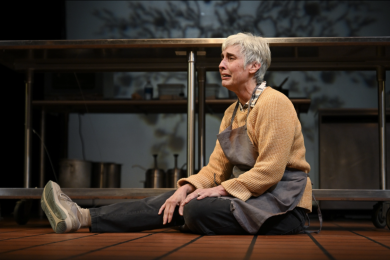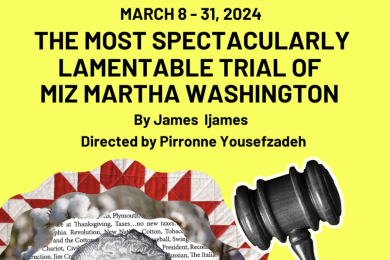Serious Play, 1776, and CAMP!
Three years ago, Ellen Fenster took over the reins at CAMP!, a five-week summer theatre camp for kids ages 7-15. Since then, she’s turned the camp into a 501(c)3 and has continued to bring in other Twin Cities theatre professionals to work with the campers. Last year, they put on The Boy Friend, a frothy homage to 1920s-style revue musicals. This summer, however, the bill was a little more serious. “ ‘It’s going to be a lot of work, but let’s do [1776],’ ” Fenster said, paraphrasing the discussion with her staff. “It felt so topical.”
1776, a musical detailing the creation of the Declaration of Independence, boasts 13 songs and quite a bit of intricate and heady dialogue: debates over independence, wordplay, arguments about editing the Declaration, condemnation of slavery, liberal and conservative politicians at loggerheads. “I’ve been amazed and comforted by the fact that what’s going on in this play is going on right now,” Fenster said. “It’s messy. It’s hard. It’s a slog. Everybody thinks they know what’s right and wrong. There’s a lot of gray. There was a period of time in the rehearsal process where the kids were like, ‘This musical’s boring. It’s so much talking, we don’t quite understand.’ But we were really deliberate in developing the curriculum this summer.”
Each year for CAMP! (exclamation point included), Fenster and her staff create a curriculum around their chosen production. A couple of the projects this summer, directed by artist-in-residence Lisa Arnold, had the campers writing their own bill of rights and creating poster art to connect to current issues. Fenster also brought in a history teacher for lessons in forms of government and American history. Campers playing the historical figures in the show—such as John Adams, Benjamin Franklin, and Thomas Jefferson—were encouraged to go home and research their characters. One of the camp’s seniors, Miles Chastain, was impressed by the level of characterization in the show: “One of the things that interested me the most about [1776] is how fleshed out the characters are because every character has their own unique personality. Whether it be a very wise man, who is Benjamin Franklin, or in my case a very outgoing Scotsman. I never knew a Scotsman served in the Continental Congress!” (Onstage, Chastain’s put-on Scottish accent was terrific.)
None of the campers I spoke with had ever heard of 1776 before this summer. Chastain said, “Me and [my friend] Ryan were joking that it was going to be a discount Hamilton.” To which senior Ryan Muschler added, “But I ended up enjoying it more than Hamilton.” Other campers were surprised by how funny the show was. “It’s a play about the Revolution and it’s about war,” said Dexter Skahill, “but, like, there’s also this guy who just makes adverb jokes the whole time.” Another camper, Mick Lynch, told me he learned more about American history than he ever did in social studies class (though he admitted to sleeping through a lot of classes).
The rehearsal process also got the kids thinking about the nature of history itself. Solvej Eversoll said, “It’s interesting to think about how different history could’ve been if [Edward] Rutledge wasn’t around or if he hadn’t made that big of a deal about [the Declaration calling for the abolition of slavery]. That’s a weird thing to think about, how one person can change so much of history.”
All of this speaks to the care Fenster and her staff of professionals take when preparing campers to perform. Not only that, it speaks to the ways in which Fenster expanded the scope of CAMP!’s production. The 1776 script calls for 24 white men and two white women, but sticking to the status quo wasn’t going to fly with her. “Not only does it not reflect our camp, but it doesn’t reflect our world or our community,” she said. “So I did some research on people that were living in the United States at that time that were not represented in this story. That was a big part of our history lesson.” In an effort to balance the scales, Fenster and company incorporated source material from Powhatan, Frederick Douglass, Elizabeth Cady Stanton, and added in Abigail Adams’ famous “remember the ladies” speech.
To those who have seen 1776 multiple times (hello), the addition of this material only served to deepen the world of the play and to show how the repercussions of the Revolution and Declaration of Independence have echoed throughout our country’s history and connect to issues today such as Black Lives Matter, the rights of indigenous peoples, intersectionality, and the renewed women’s movement. It was also an excellent way to broaden the usual story of America’s independence and to showcase campers who were ready to take on monologues. Meshach Mandel, who performed Frederick Douglass’ “What to the Slave is the Fourth of July?,” responded to the musical’s tackling of slavery in the American colonies: “It addresses slavery and how the main characters, they didn’t like slavery and they were abolitionists. I just think it’s cool that it’s not just about white men and how they started America.”
Fenster also made judicious decisions about expanding certain musical numbers to include all or portions of the entire ensemble. During the rousing “The Lees of Old Virginia,” many of the ensemble members leapt from the wings to join in on the chorus and do some do-si-dos. During “Yours, Yours, Yours,” when Adams and Abigail speak to each other across the miles, Abigail was joined by the women of the ensemble as she tells John about the sorry state of their farm. “Momma, Look Sharp,” a song showcasing a soldier’s perspective, saw the ensemble walk out in family units, waving off their sons to war.
Through all of this, it was clear each camper not only understood the logistics of the production—when to enter and exit, the steps of choreography, don’t wave to Dad—but understood the world of the musical and its associated stakes. No one was reading their lines off the back of their eyelids. Benjamin Franklin delivers quite a bit of exposition, which is gracefully written but still tricky. CAMP! senior Ryan Muschler, however, pulled it off with aplomb. Rubiana Sovell-Fernandez endowed her John Adams with an unparalleled level of energy and commitment. When Adams berates the rest of congress for spending days editing Jefferson’s Declaration draft, she yelled her head off and waved her stool in the air. I really believed Sovell-Fernandez might have an apoplectic fit, as Ben Franklin warns. Solvej Eversoll, as Elizabeth Cady Stanton, tore into her recitation of the Declaration of Sentiments at the end of intermission, and led the cast’s young women in chants of “Rights for men and no more! Rights for women and no less!” The audience burst into applause as the curtain fell and the young women continued shouting. The various young women who portrayed George Washington throughout the performance gave gravitas to their lines (sitting on a giant wooden horse didn’t hurt), suggesting they knew just how hard the Continental Army had it.
Lest you think that all of CAMP! this summer was concerned only with dissections of the Declaration and Constitution and heavy discussions of the sociopolitical history of the United States, I will let you know that each camper got to make their very own wig out of yarn and cotton balls, and they all looked fantastic. They also played theatre games and had plenty of downtime every day in the midst of classes and rehearsals to play outside and make friends. “This is a really tight-knit and strong community,” said Eversoll. “Here it’s not like anyone is against anyone else…Everyone wants to work together…I think it’s really cool to have a bunch of people who like theatre as much as I do.” One of the younger campers, Augie Ho-Chen told me: “When I first started, I was a little nervous, but CAMP! helped me learn about theatre: how to act, how to project, how to dance or sing.”
The kids also learned what it’s like to rehearse for hours: “One thing I learned is that making a play look really professional is exhausting,” Mandel told me. “Every day of the week I’d go to bed at 7 o’clock just because I was super tired after working all day.” I asked if he’d be happy to get back to his normal sleep schedule after CAMP! ended. “I’m going to be sad when this is over,” he replied.
He isn’t the only one. After their warm-up, the group of graduating “seniors”—the 14- and 15-year-olds—tearfully gathered in the center of the stage, hugging, trying to keep their makeup from running, and wishing each other broken legs. Some of them have been attending CAMP! since they were seven years old.
Ryan Muschler and Miles Chastain are two of them. Both take seriously their roles as elders of the camp, befriending younger kids and setting a good example for work ethic. Muschler did a lot of research for his part and watched the whole HBO mini-series on John Adams, which he said didn’t offer as nuanced character portrayals as 1776. “It’s very interesting that [1776] is one of the very few plays that when discussing the founding fathers actually shows that they’re not all perfect,” Muschler said. “That all the founding fathers had flaws, they’re just as human as we are and that they were just rebelling against a country that was treating them unfairly. And in a time in which there’s a risk of a government dismantlement going on, I think it’s very important to discuss these types of issues and to teach the youth of America about these issues.”
“Doing this camp and doing this play can be quite therapeutic,” Fenster said. “This play in particular this summer has felt very therapeutic because we’re educating ourselves, we’re practicing empathy, we’re taking care of ourselves, we’re working towards a common goal. And we try to do really high quality work with young people.” That was evident in the confidence and care each camper took onstage. They projected, articulated, tackled their choreography with gusto. Many of them had crafted voices and specific physical movements that fleshed out their characters further. Some songs called for close harmonies, which these kids pulled off, no sweat. They understood the stakes of the show. They’d learned a lot over five weeks. Most important: They had fun. They engaged in some serious play. I hope every camper continues to perform, continues to learn, continues to grow. After meeting them, reading their posters, and watching them onstage, I have little doubt they’ll do just fine.
If you or anyone you know might be interested in enrolling in CAMP! next summer, visit tctheatercamp.org. Scholarship funds are available.




